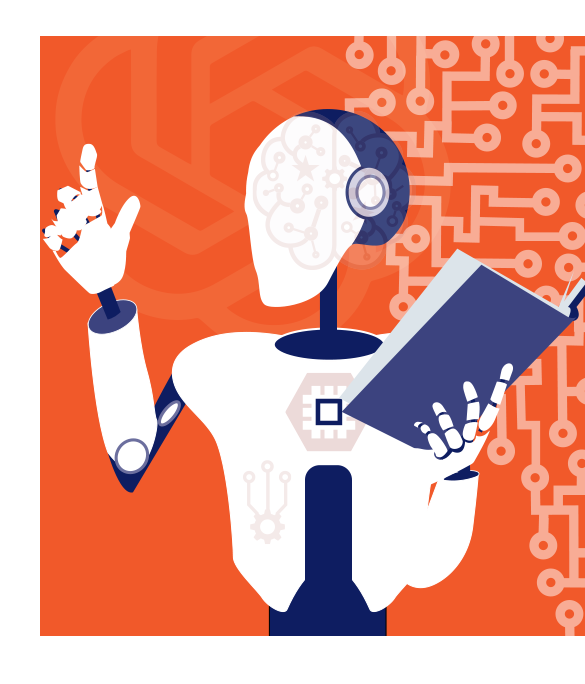The Impact of Artificial Intelligence on College Instruction
quote
My goal was exposing students to the possibilities and limitations around producing written content with language models. By directly engaging with these technologies for learning goals, rather than entertainment alone, their discernment around ethical use strengthens.
text

Dr. Szymon Machajewski has taught computer science, data science, programming, and other related subjects in the Midwest since 2003. With a career focus on educational technology and software engineering, Dr. Machajewski is an innovator in gameful pedagogy and learning analytics and has worked with artificial intelligence (AI) for over a decade. Last fall, he implemented AI with the intention of using it as a learning tool in his data and programming courses. Dr. Machajewski is the Associate Director of Academic Technology and Learning Innovation at LTS. This interview was originally published as part of an OpenStax series on the impact of using AI in education. OpenStax is a nonprofit educational technology initiative based at Rice University.
What kinds of AI assignments did you bring into your classroom this year?
This year, I curated Codecademy tutorials and other generative AI literacy materials for students to consume. I also encouraged them to utilize generative tools in self-directed ways, such as exploring textbook topics more deeply or collaborating with AI co-authors on written assignments.
From an instructional perspective, I implemented some basic AI activities this year, with the goal of boosting student engagement. Leveraging the free ChatGPT system, I composed extended prompts for students to build upon in creative ways. I found that by seeding these prompts with rich contexts and details, students could take over the dialogue seamlessly. This freed the AI assistant to pose follow-up questions and probe students’ thinking, sparing students the cognitively taxing work of asking questions. Allowing a context-aware Chatbot to continue an instructor-initialized discussion makes participation more dynamic for learners.
What motivated you to encourage your students to implement AI as a learning tool?
My goal was exposing students to the possibilities and limitations around producing written content with language models. By directly engaging with these technologies for learning goals, rather than entertainment alone, their discernment around ethical use strengthens.
Overall, my mix of light guided activities alongside student-driven experimentation aims to demystify AI through firsthand experience. Moving beyond the hype via practical classroom integration grants students vanguard opportunities to see through the AI marketing messages clearly.
Have you noticed any impacts – positive or negative – that AI has had on your students’ engagement or achievement?
I think it may be too early to measure the achievement effects of AI usage. Some small-scale studies have found AI collaboration to have a positive effect on academic progress. I think there is an opportunity for crafting prompts to help students explore the subject matter and find something that will spark their interest. Richard Feynman wrote about the need to provide a broad exposure to a subject matter in order for students to find a hook that works for them.
Generally, what attitudes do you notice your students holding about AI?
Students especially approach new technology with an openness that allows them to learn through trial and error at impressive speeds. It has been my experience that students readily welcome AI as just another feature of modern digital life. With less reputation, job prospects, or precious time on the line, they tinker more boldly than faculty and manage to quickly gain competency.
How have students reacted to being allowed – and encouraged – to use AI tools in your course?
Students responded positively to incorporating generative AI tools into class activities. While some students were previously aware of chatbots like ChatGPT, actually utilizing them to complete assignments led to deeper hands-on exploration. When tasked with putting an AI assistant to work as part of their coursework, students progressed beyond casual previewing into actively testing capabilities and limitations.
This shift from passive awareness to needing functional competency opened eyes wider to the realities and potential of writing with generative language models. Direct engagement proved informative in ways passively reading about chatbots cannot. By structuring participation around assigned work rather than unguided amusement, generative AI became less of a novelty and more of a utility that students scrutinized more critically. The feedback I gathered found this transition from hype to practical application worthwhile in provoking thoughtful evaluations from learners dynamically adapting to emerging technologies.
Do your students have a clear understanding of your position on using AI for assignments in your course? How did that conversation play out?
I make a point to set clear expectations around AI use for my students, emphasizing that policies may differ across courses. I strive to foster open conversations that help students feel comfortable asking questions about AI tools. Given the stigma emergent technologies often carry in higher education, I believe it’s crucial that students develop discernment navigating this landscape.
What do you hope your students take away from their experiences with using AI in your course?
Rather than reacting with reflexive distrust, my aim is to model how we might critically and ethically incorporate AI’s capabilities as responsible, lifelong learners. While particular instructors may respond to these technologies differently, my priority is ensuring students appreciate the nuances at hand so they can make informed choices about AI’s role in their learning process. By taking an approach centered on dialogue and transparency from the start, I hope to equip students to thoughtfully evaluate opportunities and limitations as AI’s classroom integration accelerates.
If you are an instructor interested in sharing your perspective with the campus, connect with us at LTS@uic.edu or submit an editorial piece to LTS.